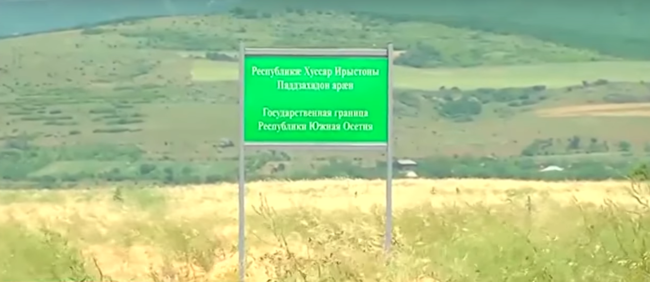
 As reports of a ‘Russian land-grab’ make the rounds locally and internationally, authorities in both Tbilisi and Tskhinvali (Tskhinval) say that the line dividing South Ossetia from Tbilisi-controlled territory has not been moved.
As reports of a ‘Russian land-grab’ make the rounds locally and internationally, authorities in both Tbilisi and Tskhinvali (Tskhinval) say that the line dividing South Ossetia from Tbilisi-controlled territory has not been moved.
Georgian media widely reported on 4 July that South Ossetia had pushed farther into Tbilisi-controlled territory, citing a comment made by Georgia’s State Security Service (SSG) on the same day, saying that ‘as a result of signs being installed on the so-called border in vicinity of the village of Bershueti in Gori District, farmlands of local residents fell under Russia-occupied territory’. The statement doesn’t specify when this happened.
According to the reports, the alleged land-grab affected local farmer Gia Khodeli, who was left without 10 hectares of agricultural land he cultivated.
OC Media has confirmed that border signs were installed near the village of Bershueti, yet in contradiction to local and international media reports, this did not take place on 4 July, and did not result in Tbilisi losing control of any additional territory.
South Ossetia has also denied claims that Russian FSB troops had advanced deeper into Tbilisi-controlled territory near Bershueti village, claiming the ‘banners were installed in accordance to the existing map’ and that Tbilisi was informed about the move beforehand.
Georgia has long accused Russia, whom it considers the only legitimate side in the South Ossetian conflict, of implementing a ‘creeping occupation’. There is no natural border between Tskhinvali and Tbilisi controlled territories and the gradual installation of fences on the line separating both territories — variously referred to as the ‘administrative boundary line’, ‘occupation line’, and ‘state border’ — has been described by Georgian authorities as illegal. In the past, this demarcation process, known locally as ‘borderisation’ has resulted in South Ossetia pushing farther into Tbilisi-controlled territory.
New signs installed
According to the Caucasian Knot, on the 11 July meeting under the Incident Prevention and Response Mechanism (IPRM) held in Ergneti, the head of the South Ossetian delegation, Murat Dzhioyev, said that ‘border marks in the vicinity of the village of Tsinagar [a Tskhinvali-controlled village bordering Bershueti] were installed in accordance to the designations on the map’ and that there had been no banners at that location before.
The SSG has confirmed to OC Media that the new signs were installed ‘in the end of June 2017 precisely at the administrative boundary line’, in a location controlled by neither Tbilisi nor Tskhinvali. This has also been confirmed by the European Union Monitoring Mission (EUMM).
According to EUMM’s observations in the area, ‘several “green signs” were installed in the vicinity of Bershueti (Gduleti) on 19 June 2017 very close to the Administrative Boundary Line on a position which is not under control of the Georgian government (Tbilisi Administered Territory)’.
Dzhioyev said that two signs were installed in June so that ‘residents of the bordering villages could understand where they were allowed to cultivate fields, and where not to’. The new signs cut one farmer, Gia Khodeli, off from the agricultural land he cultivated.
According to Dzhioyev, Tskhinvali had informed Georgia of their intention to place the signs earlier in April, at an earlier IPRM meeting.
The SSG told OC Media on 12 July that ‘since the beginning of borderisation’, Tskhinvali has claimed they would continue the demarcation process. However, according to them, Tskhinvali had not informed Tbilisi about this particular move.
On 11 July’s IPRM meeting, Ambassador Kęstutis Jankauskas, Head of the EUMM ‘expressed his appreciation of the pre-announcement of such installations and encouraged, also in this respect, to continue to use the Hotline for mutual information sharing’, according to an EUMM press release.
Rising tensions
Georgia’s Foreign Ministry has blamed Russia for the process and said the move was a part of ‘continuation of the illegal process of the so-called borderisation’ and claimed it obstructed Georgia’s efforts to achieve ‘peaceful resolution of the conflict’.
The Russian Foreign Ministry on 5 July labelled Georgia’s statement an ‘informational provocation’ and said they were sure that the next IPRM meeting would ‘like in all previous cases, earnestly reveal the falsity of these absurd claims’.
Georgia’s president Giorgi Margvelashvili, calling on the international community to condemn the action, said he was outraged by the move.
On 8 July, after the installation of the signs, tens of Georgian students held a protest in Bershueti against the demarcation, rallying against ‘Russian occupation’. Dzhioyev said that protesters broke the sign and wrote obscene words on it. He also pointed out that ‘all [demarcation] works are being carried out by South Ossetian border guards, yet the Georgian side blames the Russian border guards anyway’.
‘We brought all the evidence to the Georgian delegation and told them that such incidents should not happen again’, he added.
Both Tbilisi and Tskhinvali confirm that the ‘borderisation process is set to continue’. RFE/RL quoted Kakhaber Kemoklidze, deputy head of the SSG’s analytical department, as saying ‘despite the Ossetian side following the occupational dividing line, this is a new wave of so-called borderisation, which began with wires, fences, signs, and ends with trenches’.
On 12 July, RFE/RL’s Georgian service reported that South Ossetia started digging trenches in the vicinity of four villages of Avlevi, Knolevi, Tseronisi, and Tamarasheni. Dzhioyev asserted the trenches were being dug ‘so that fire would not spread on a large scale’.
For ease of reading, we choose not to use qualifiers such as ‘de facto’, ‘unrecognised’, or ‘partially recognised’ when discussing institutions or political positions within Abkhazia, Nagorno-Karabakh, and South Ossetia. This does not imply a position on their status.




 13 July 2017
13 July 2017


